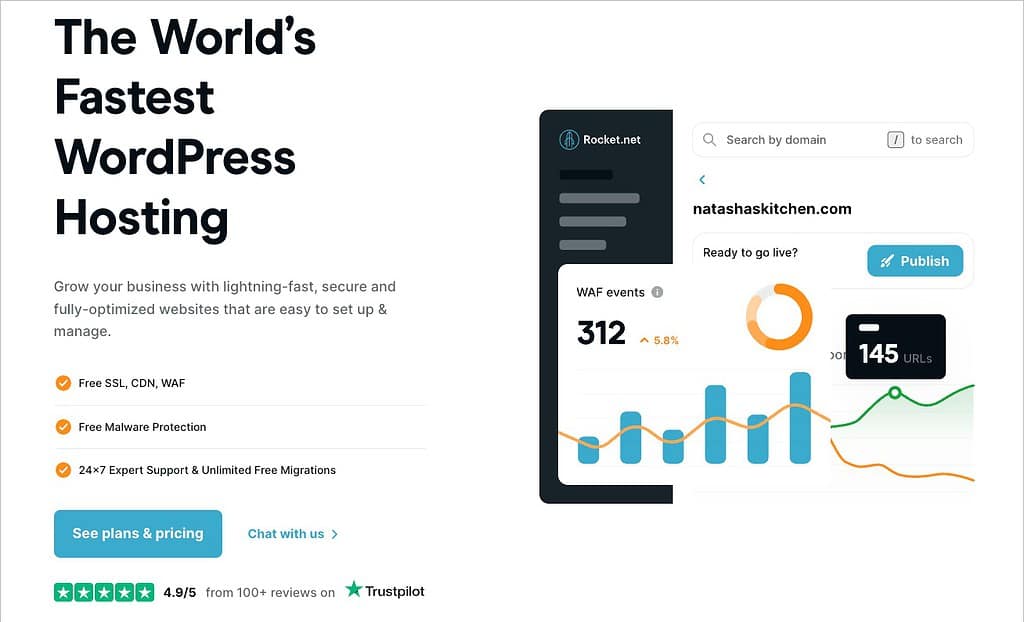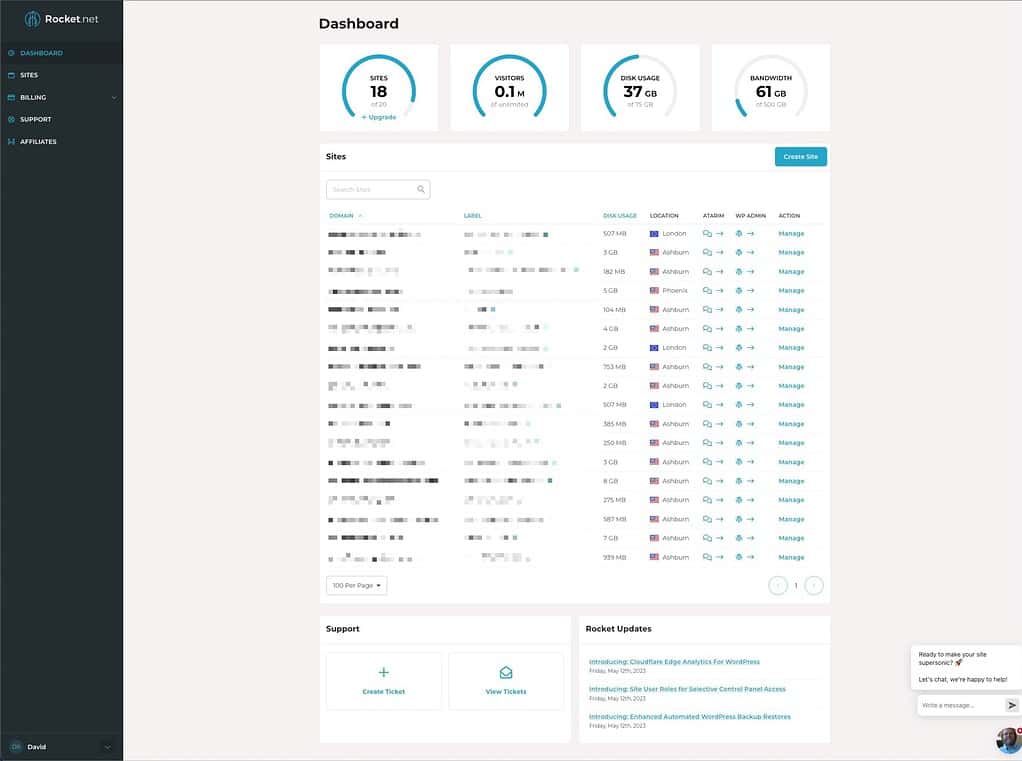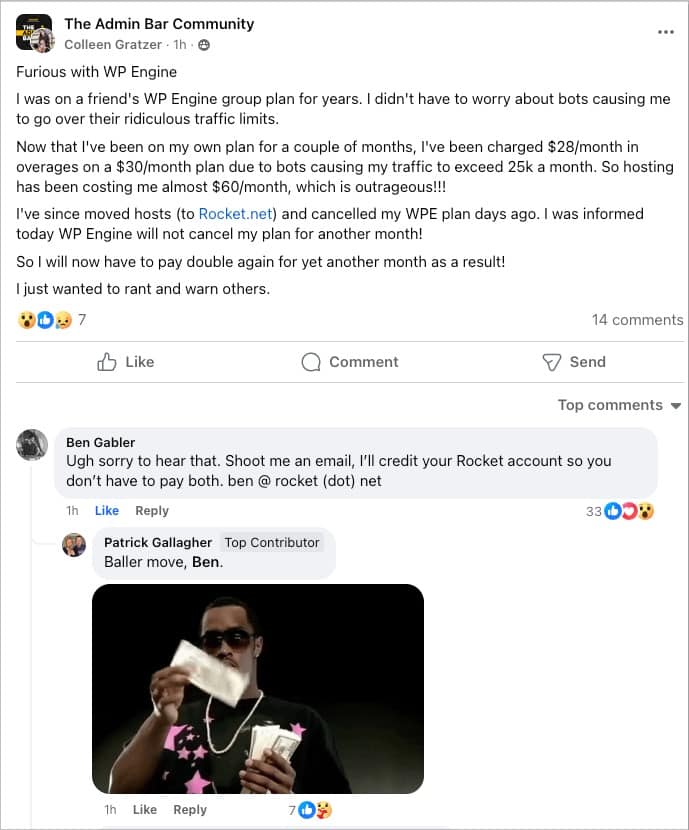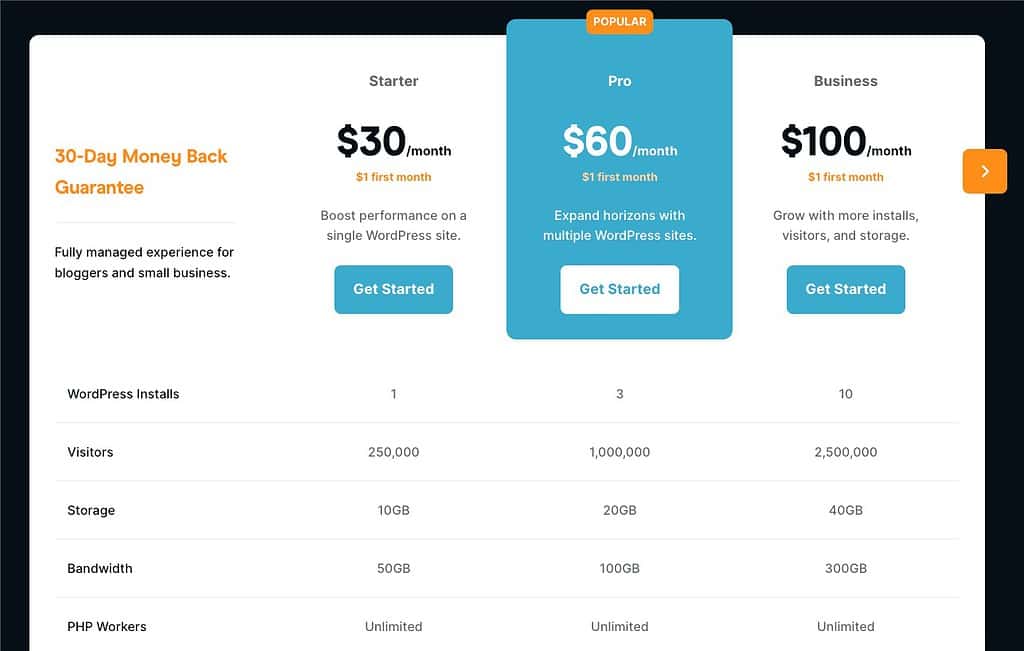I switched from Cloudways to Rocket.net hosting. I've now been using Rocket for over a month. What do I think? Here's my experience with Rocket.Net hosting...

As of this writing, it has been about a month since I announced that I was changing my web hosting from Cloudways to Rocket.Net. I have been using it for a month now. I have migrated many of my clients to Rocket. So…
What do I think?
What do you need to know about using Rocket.net hosting?
Well, let’s get in to it.
In This Post…
Why Makes Rocket.Net Unique?Rocket.net Performance In The Real WorldWorking With The Rocket.Net Control PanelMy Experiences With Rocket.Net SupportRocket.net Pricing And Is It A Good Deal?Anything I Don’t Like About Rocket.Net?My Final Thoughts For This ReviewWhy Makes Rocket.Net Unique?
Pretty much all web hosts (and there’s a ton of them) call themselves fast. Almost all of them brag about their performance. Some of them even have the cajones to call themselves the “fastest”.
Rocket.net calls itself “the world’s fastest WordPress Hosting“.

Now, I’m not going to sit here and blindly agree that Rocket is the fastest. But, I will say… it is fast. 
What makes Rocket interesting is the direct, tight integration with Cloudflare Enterprise. It is automatic. It is at the hosting level. No plugins required. And certainly no independent signup for Cloudflare required. Cloudflare Enterprise would cost you around $6,000/month if you were to try to get it on your own.
Basically, Rocket.net provides a highly optimized server and tech stack that is WordPress specific, but along with a native integration to Cloudflare Enterprise so that much of your website’s static resources and caching is served on the fastest global network that exists at this time.
No need for caching plugins because it is automatic.
The Rocket servers are high-end. 32+ CPU cores. 128GB of RAM. This is a server that you’d pay a fortune for with most hosts. And because of the integration with Cloudflare, servers are not even close to tapped out.
On top of all this, the control center is simple to use. There’s less complexity because it is WordPress-focused.
And then there’s the support. It is top notch. Available via both live chat and email. And they’re incredibly fast.
Now, I realize all of that more or less echos their website. It sounds like an ad. But, what really would help you is real-world experience.
What is it actually like to use Rocket.net?
Rocket.net Performance In The Real World
Let me give you my first-hand experience…
I came from Cloudways. I still like Cloudways. I still host sites with Cloudways. But…
This site sped up quite a bit in a concrete noticeable way simply by moving it to Rocket. Period.
One of the biggest real-world things that you notice that can serve as a reliable indicator of hosting power is the speed of things in the WordPress admin panel. With Cloudways, the admin panel would routinely slow down to the point of annoyance. Especially at times when the server was busy doing backups or other background tasks, clicks on things in the admin panel could be absolutely grueling in their speed. Sometimes the site would just crash.
That disappeared when I switched to Rocket.
It is absolutely clear that I have more horsepower on Rocket than I did on Cloudways. When I am working on the site in the admin panel, I simply do not have annoying slowdowns, crashes, memory outages and the things I saw on Cloudways.
While Cloudways included Object Caching Pro, it seems to operate far better on Rocket. It isn’t automatic with Rocket. I have to request it, but it is still free.
In terms of site performance scores, my scores definitely improved. That said, there are a lot of factors that go into site performance scores and hosting isn’t the only one. But, I did get performance score increases when I switched to Rocket.Net.
Working With The Rocket.Net Control Panel
Coming from Cloudways, I find the control panel (they call it “control center”) of Rocket.Net to be simple and easy.
One of the ideas of Rocket is that it is managed and 100% dedicated to WordPress. So, by it’s nature, it is going to be simplified. This isn’t one of those hosts where you’re going to be tossed into a raw cPanel account and left to fend for yourself.

The Rocket.net control center is easy. It’s simple. It doesn’t provide more than is needed. While Cloudways was fairly easy to deal with, it still had some things to it that were best left to the more technical types. Rocket is noticeably simpler than that.
Included is:
A basic overview where you can view basic state, add FTP accounts, and bring in team members to access the control center A list of plugins and themes, with the ability to update and deactivate/activate plugins right from the control center A file manager Full backups manager, with automatic daily backups as well as the ability to do a manual backup whenever you want Access to logs, plus ability to enable activity log to see actual user activity within WordPress (awesome for agencies) Basic stats and reporting Database management via PHPMyAdmin Command line management via WP CLI Automatic WordPress updates (if you want them) One-click logins to WordPress admin (will default to the first admin user of ID #1) One-click creation of a staging site (on an automatic temporary domain)It is simple. Many things are just taken care of automatically. For instance, you don’t have to worry about issuing yourself an SSL certificate. The process of going live with your site just automatically takes care of it once you authenticate your domain. Easy.
And certainly, this is no cPanel. cPanel is a bloated beast sea of icons and annoying self-management. I don’t like cPanel. I prefer hosts which have put the work into creating a beautiful, user-friendly control panel for their clients. Rocket has clearly done that.
My Experiences With Rocket.Net Support
I prefer web hosts that offer support via live chat. Email or a support desk is OK, but I prefer live chat. Personally, I don’t care about phone support as I find that to be too time consuming.
Rocket.net offers support via their helpdesk and email, but more important they have live chat support sitting right there on the site plain as day. And get this…
They’re good.
Really good.
This isn’t some person sitting there blindly following scripts and treating you like an idiot. On the contrary, their support treats you like… a co-worker.
They’re regular people. They talk like normal people. They know WordPress.
Response time is incredibly fast. I literally have a real human talking to me in 30-45 seconds after I start the chat.
In those times when they need to advance it to the more advanced support folks via an email ticket, the response time is fast.
The CEO of the company (Ben Gabler) is also heavily involved. Twice now, I’ve had the CEO directly reply to my support tickets. It says something about a company when the person running it directly deals with customers because it means they are intimately involved rather than managing it without any idea what’g going on with clients.
And to top it off, here’s a little something I noticed in The Admin Bar on Facebook…

Ben is the CEO. This complaint about WPEngine had nothing to do with him or Rocket. But, he comes in and offers an account credit just to help out with his frustrations with WP Engine.
As Patrick Gallagher (from Gridpane) called it… that’s a “baller move”. 
Rocket.net Pricing And Is It A Good Deal?
To be clear, Rocket.net hosting isn’t the cheapest. It isn’t expensive either. It is right there in the ballpark with other hosting with real managed WordPress hosting.
It starts at $30/month for a site… and moves up to 10 sites for $100/month.

Your cost-per-site improves as you bring more sites over. For one site, the pricing is definitely on the high end.
More similarly to hosts which use Google Cloud, there are limits on disk space, visits and bandwidth. I feel as if those limits are more than generous. Not only that, there are pretty affordable overage charges if you happen to go over that (which isn’t likely).
There’s no doubt that Rocket hosting is more expensive than Cloudways at first. But, as you bring in more sites, the cost benefit improves. With a VPS on Cloudways, you can definitely host more sites on your server and there are (in theory) no limits. However, in the real world, there are indeed limits because of the more limited server resources available to all of those sites.
Rocket is all inclusive, too. You aren’t nickel-and-dimed for extras (something a lot of hosts do these days).
Anything I Don’t Like About Rocket.Net?
As of this writing, I have 18 sites hosted on Rocket. I fully expect that to go up quickly. I still have many of my Concierge clients which are not on Rocket.
I’ve also been using it for over a month now.
So, anything I don’t like?
To be honest, not much. I’ve had very little trouble so far. But, here’s a few little annoyances…
It would be nice if their pricing was per-site rather than large tiers. This way bringing a new site into my account wouldn’t immediately jump my price up $100/month once I cross one of their thresholds. I’ve had one issue inviting a client into the control center for their own site. It was a legimate bug which Rocket solved quickly once they verified it. Every time I have a support chat with them, I am asked to rate the interaction. And I am forced to do that before I can start a new chat. I wish that wasn’t so frequent as I find it unnecessary and slightly annoying. The one-click WPAdmin login is tied to user ID #1. This leads to a disconnect in the instance when the user you want to log into isn’t #1. It would be nice if we could choose a default user for one-click login. Useful for us agencies with multiple clients.Those are probably the only things so far that I’ve been slightly annoyed by with Rocket.net. I find these things to be minor.
My Final Thoughts For This Review
So far, I am thrilled with Rocket.net.
Is Rocket for everybody? Simple answer = NO. And here’s why…
Rocket is a top-rung web host for WordPress. One of the best in the market. For this reason, the pricing is higher than a lot of hosts out there. For this reason, I don’t think Rocket is a great fit for people with smaller sites or with a lot of smaller sites.
Rocket is the best fit for people with well-developed, larger WordPress sites. Membership sites and sites with ecommerce stores are ideal for Rocket. People with smaller blogs will find the pricing and the horsepower to be overkill.
I still keep my smaller sites on Cloudways. Over there, you can pack a lot of smaller sites on one VPS and it is quite cost effective. But, the sites that could really benefit from the horsepower of Rocket will do much better in this environment.








